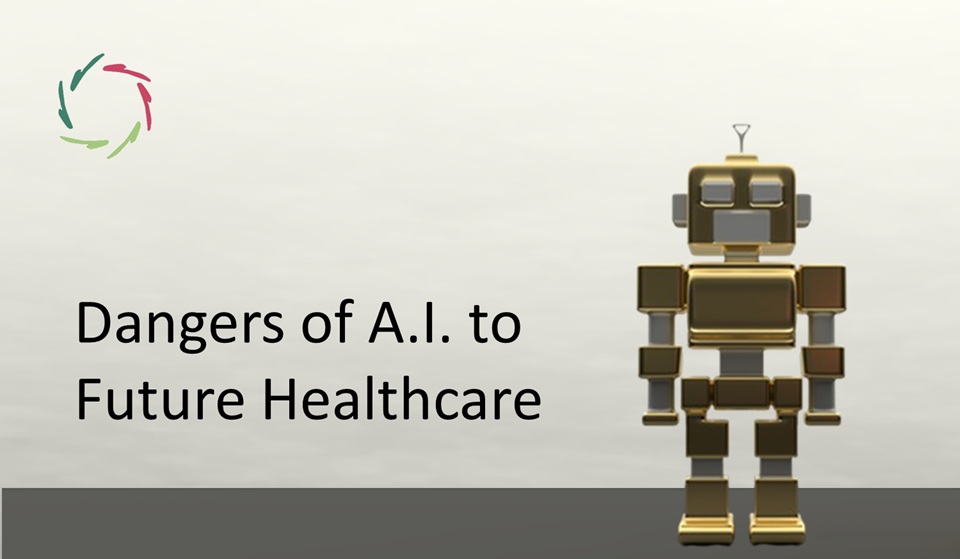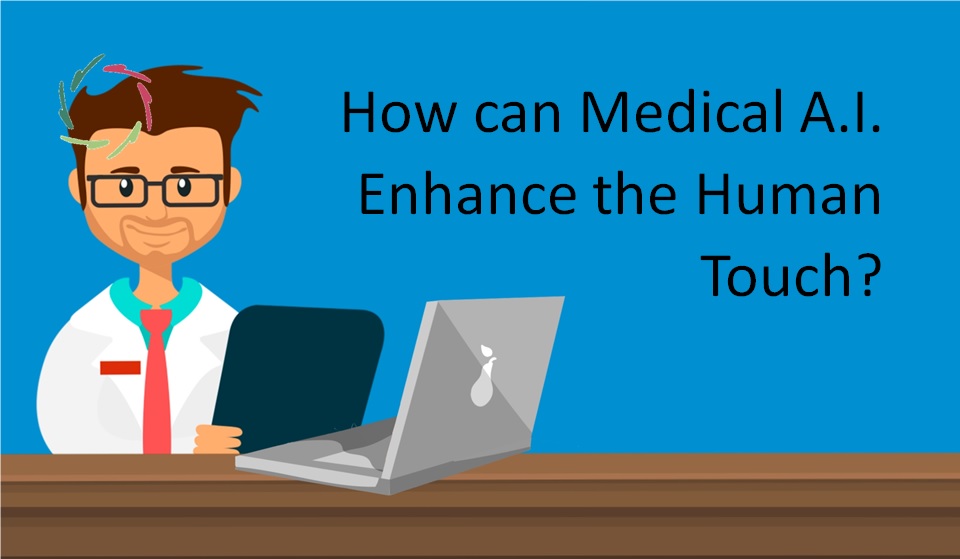Dangers of A.I. to Future Healthcare

Artificial intelligence (A.I.) holds extraordinary potential in healthcare, from advancing diagnostics to personalizing treatments. Yet, as powerful as A.I. is, its risks are equally profound.
Without careful oversight and ethical alignment, A.I. could amplify existing flaws in the system, create new dangers, and ultimately undermine the very humanity it aims to support. This blog briefly outlines common concerns and then explores deeper, more unique perils through the lens of AURELIS principles.
Five straightforward dangers
For the sake of completeness, let’s quickly acknowledge five well-known risks of A.I. in healthcare:
- Bias and inequity: A.I. can inherit and amplify societal biases, worsening disparities in care.
- Privacy and security: Patient data processed by A.I. is vulnerable to breaches or misuse.
- Over-reliance: Dependence on A.I. might erode critical human skills like clinical judgment and empathy.
- Errors and accountability: It’s unclear who bears responsibility when A.I. makes mistakes — physicians, developers, or the system?
- Economic displacement: A.I. could destabilize the workforce by automating certain roles in healthcare.
While these challenges deserve attention, they are not the focus here. Instead, let’s delve into deeper, less-explored risks that threaten the foundation of Compassionate and integrative care.
The reductionist trap
A.I.’s ability to process massive amounts of data makes it incredibly effective at addressing symptoms, but this efficiency comes at a cost. By focusing solely on measurable outcomes, A.I. risks reducing patients to mere datasets, stripping away their humanity.
This is especially concerning in psychosomatic conditions, where symptoms often carry symbolic meanings. As A.I. becomes more adept at treating symptoms, the symptom’s voice may be silenced, and its deeper message overlooked. For instance, chronic pain might be eliminated without exploring the emotional or existential roots behind it.
This dehumanizing reductionism could widen the gap between medicine and the patient’s inner reality, as explored in Medical A.I. for Humans.
A.I.-driven genetic engineering: the risks of pleiotropy
A.I.’s role in genetic engineering brings immense promise but also profound risks. A single gene often influences multiple phenotypic traits — a phenomenon known as pleiotropy. While A.I. might identify genes associated with desirable traits, altering them can have far-reaching, unintended consequences.
For instance, targeting a gene to enhance intelligence might inadvertently diminish creativity, empathy, or resilience — traits that are equally vital but harder to measure. These trade-offs are particularly insidious because they may remain invisible until long after changes are made, potentially affecting not just individuals but future generations.
This highlights A.I.’s inherent reductionism: it excels at optimizing measurable outcomes but struggles to account for the interconnectedness of biological systems. Without a guiding framework rooted in human depth and Compassion, A.I.-driven genetic engineering risks eroding the very qualities that make us human.
Amplifying the war mindset
The ‘medicine of war’ paradigm – focused on defeating disease as an enemy – could gain further dominance with A.I. Success in aggressive treatments or symptom elimination may reinforce the belief that this approach is morally good or even sufficient. However, such victories are often shallow, leaving underlying issues unaddressed.
This mindset perpetuates inner dissociation and fosters systemic complacency, as discussed in The problem with corona is the problem with medicine.
Loss of autonomy and trust
A.I. has the potential to exacerbate power imbalances in healthcare. Physicians might wield A.I.-driven insights as tools for control, reinforcing the idea that “knowledge is power.” Patients, meanwhile, could feel increasingly commodified — viewed as cases to manage rather than as whole individuals to heal.
This erosion of trust is compounded by opaque algorithms, which make it difficult for patients and even practitioners to fully understand or challenge A.I. recommendations. More on this dynamic can be found in How can Medical A.I. enhance the human touch?.
Risk of algorithmic determinism
A.I.’s reliance on algorithms to predict outcomes and recommend treatments introduces the danger of algorithmic determinism. This occurs when A.I. systems prioritize their predictions and suggestions so heavily that they overshadow human judgment and creativity.
For instance:
- Individual uniqueness: A.I. may generalize based on datasets, failing to consider the unique needs and experiences of individual patients.
- Risk of self-fulfilling prophecies: An A.I. prediction of poor outcomes might inadvertently influence healthcare providers to adopt less aggressive or optimistic treatments, ultimately confirming the prediction.
Algorithmic determinism risks creating a healthcare system where human agency is diminished, and decisions are dictated by algorithms. This highlights the need for balance between human intuition and A.I.-driven insights.
Over-categorization vs. human complexity
A.I. thrives on categorization, but this double-edged sword can do more harm than good. While creating more categories can improve precision, it risks fragmenting the bigger picture.
In psychosomatic care, for example, dividing ‘stress’ into subtypes might refine treatments but also obscure the broader symbolic role of stress as a messenger of inner imbalance. Over-categorization may hinder holistic care.
The risk of A.I. in preventive medicine
A.I.’s predictive power has the potential to revolutionize preventive medicine, but this also carries significant risks. By identifying even the smallest statistical likelihood of disease, A.I. might encourage an excessive focus on risk elimination. This could lead to a hypochondriac mindset where individuals pursue countless preventive examinations, driven by fear rather than necessity.
Such an approach would inevitably uncover anomalies — most of which may never cause harm. Yet these findings could trigger unnecessary treatments, further medicalization, and a loss of trust in one’s own body. Instead of fostering well-being, A.I. could create a culture of over-monitoring and anxiety, turning preventive medicine into a burden rather than a benefit. This aligns with the broader concerns discussed in How can Medical A.I. enhance the human touch?, which warns against over-reliance on technology at the expense of human depth.
Risk of data overreach and patient detachment
A.I. systems thrive on data, but the sheer volume of information they require can introduce two significant dangers:
- Overreach into personal lives
The drive for ever more accurate predictions might lead to invasive data collection, including monitoring aspects of patients’ lives that were previously private (e.g., sleep patterns, social behaviors, or even emotional states). This risks turning healthcare into an all-encompassing surveillance system. Moreover, pPatients may feel reduced to their data, detaching from their sense of agency and ownership over their health.
- Shifting the patient’s role
Patients might become passive participants in their care, overwhelmed by the complexity of their own A.I.-generated data. Instead of engaging actively with their health, they may defer entirely to A.I. interpretations.
This risk emphasizes the need to maintain a balance where patients remain empowered and connected to their health, rather than alienated by overreliance on data.
Ethical and philosophical blind spots
Unlike humans, A.I. lacks the capacity for genuine understanding or Compassion. Non-Compassionate A.I. prioritizes efficiency, leading to solutions that ignore the deeper, symbolic dimensions of care. For example, an A.I. system might recommend aggressive treatments based on statistical outcomes, disregarding the patient’s emotional or spiritual needs.
This highlights the stark contrast with a Compassionate A.I. like LISA, who seeks to align with human depth and meaning.
A philosophical danger of mind-body unity
The growing understanding of mind-body unity, while a breakthrough in healthcare, comes with a subtle but profound risk: the potential reduction of the mind to mere biology. If A.I. reveals how mental phenomena correlate with bodily processes, some may wrongly conclude that the mind itself doesn’t exist — just ‘body talk’ in disguise.
This philosophical stance, known as reductionist materialism, dismisses the unique capacities of the mind to view life meaningfully. Such a view could strip humanity of dignity, reducing individuals to material commodities ripe for exploitation. AURELIS emphasizes the importance of honoring the mind as an integral part of the whole, as LISA strives to do by helping individuals connect with their deeper selves.
The danger of misuse and weaponization
In a profit-driven healthcare system, A.I. could be exploited to maximize revenue rather than enhance care. Hospitals might use A.I. to identify high-revenue treatments, driving unnecessary interventions while competing with one another.
On a global scale, unequal access to advanced A.I. systems could widen disparities between wealthy and underserved regions. This risk of misuse underscores the need for vigilance.
AURELIS perspective: The importance of human depth
AURELIS emphasizes respect for the total human being — mind, body, and human depth. In healthcare, this means moving beyond reductionism to honor the complexity and meaning of the human experience. A.I. aligned with these principles can support true healing, as LISA strives to do.
Unlike conventional A.I., Lisa is designed to help individuals connect with their deeper selves, fostering integration and Compassion. This approach, rooted in the AURELIS vision, shows how A.I. can transcend the dangers of dehumanization and reductionism.
A call for vigilance and alignment
A.I. is neither inherently good nor bad; it’s a tool shaped by the intentions of those who develop and use it. As healthcare increasingly adopts A.I., we must ensure its alignment with ethical, human-centered values.
This involves not only addressing technical and ethical risks but also incorporating the symbolic and psychological dimensions of care.
A call for depth and Compassion in A.I. development
At the heart of all the dangers specifically outlined in this blog lies a fundamental issue: the lack of depth and Compassion in how A.I. is developed and integrated into healthcare. Without these qualities, A.I. risks reducing patients to datasets, perpetuating inequities, and reinforcing adversarial approaches to medicine.
This is not merely a technical or ethical failure — it is a failure to honor the full complexity and dignity of human experience.
Compassion as a guiding principle
Compassion is not a ‘soft’ ideal; it is a transformative force that can bridge the gaps A.I. currently struggles to address. By integrating Compassion into A.I. systems:
- Patients are seen as whole beings, in body and mind, not just carriers of symptoms or risks.
- Healthcare becomes truly collaborative, with A.I. serving as a supportive tool rather than a controlling force.
- Ethical dilemmas are approached with in-depth humanity, ensuring that efficiency never comes at the expense of dignity.
Depth as a counter to reductionism
Depth in A.I. development means respecting the interconnectedness of mind, body, and spirit. It requires acknowledging that:
- Symptoms often carry symbolic meanings that cannot be captured by data alone.
- Human complexity demands holistic solutions, not fragmented categorizations.
- True healing comes not from eliminating problems but from fostering integration and growth.
LISA as a model for what A.I. can be
A Compassionate A.I. like LISA embodies these principles. By helping individuals connect with their deeper selves, LISA shows how technology can support – not replace – human depth. This approach aligns with the AURELIS vision of fostering integration, openness, and respect for the total human being.
A hopeful vision
The future of A.I. in healthcare is not predetermined. While the dangers are real, they are also opportunities for reflection and transformation. By committing to depth and Compassion, developers, practitioners, and policymakers can guide A.I. toward a role that enhances human dignity and fosters genuine healing.
The question is not whether A.I. can reshape healthcare — it is whether we will shape AI to align with our highest values.
―
Addendum
Frequently Asked Questions
[If you’d like Lisa to elaborate on any of these, feel free to ask Lisa].
- How can A.I. avoid the reductionist trap and dehumanization in healthcare?
A.I. can avoid this by prioritizing human-centered design, incorporating both conceptual and subconceptual dimensions of care. LISA, aligning with AURELIS principles, aims to honor human depth and foster integration rather than just treating symptoms.
- Is it possible to reconcile the efficiency of A.I. with the need for Compassionate care?
Yes, but it requires careful alignment. Compassionate A.I., like LISA, shows how technology can complement human care by facilitating self-awareness, supporting meaningful exploration of symptoms, and enhancing the physician-patient relationship.
- What steps can be taken to ensure A.I. doesn’t amplify the war mindset in medicine?
To counter this, healthcare systems must shift from adversarial models of care to integrative approaches. A.I. should be developed to support the whole person, treating symptoms as signals of deeper needs rather than enemies to be eradicated.
- How do you propose addressing biases in A.I.?
Biases can be mitigated by diversifying training data, incorporating ethical oversight, and aligning A.I. systems with universal human values rather than cultural or financial incentives. AURELIS principles offer a strong ethical framework for such alignment.
- What role does trust play in A.I. adoption, and how can it be fostered?
Trust is crucial for successful A.I. integration in healthcare. Transparency in how A.I. makes decisions, a focus on explainability, and prioritizing the patient’s role in care can foster trust. This is where Compassionate A.I., as discussed in the blog, stands out.


